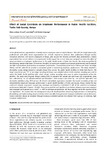International Journal of Multidisciplinary and Current Research ISSN: 2321-3124 Research Article Available at: http://ijmcr.com 1143|Int. J. of Multidisciplinary and Current research, Vol.6 (Sept/Oct 2018) Effect of Social Correlates on Employee Performance in Public Health Facilities, Turbo Sub County, Kenya

View/
Date
2018-10Author
K’osuri, Mercy Adoyo
Kalei, Ann
Onyango, Robert
Metadata
Show full item recordAbstract
In this globalized era, organizations certainly require employees who are high achievers. This calls for a high demand for
professionals with skills, hence organizations are virtually required to embrace their preferences through socially
innovative practices. Civil service employees in Kenya, who include the Ministry of Health staff performance is below
expectations thus service delivery is compromised. In this regard the current study was designed to assess the effect of
social correlates on employees’ performance in the public health sector in Turbo Sub-County. The study was guided by
the following specific objectives: To examine the effect of supervisors support on employee performance and to analyze
the effect of employee participation on employee performance. Conservation of Resources Theory and Social Exchange
Theory had the potential to provide a conceptual guide in maximizing employee performance. The study adopted a
descriptive survey design based on samples drawn from across the public health facilities in Turbo Sub -County. The
target population was 332. A two-stage sampling technique was adopted where cluster random sampling was used to
select the Public health facilities after which simple random sampling were used to select respondents within the
facilities. The study used Krejcie& Morgan table,(1970) to calculate the sample size which was 181 respondents. Data
was collected by use of self-administered questionnaires. Data analysis was done by use of both inferential and
descriptive statistics using SPSS version 20. Results of multiple regressions revealed that social correlates jointly and
independently influenced employee performance in public health facilities in Turbo Sub-County, Kenya. Jointly the two
constructs namely supervisors support and employee participation contributed 51.4% of the variation in employee
performance (Adjusted R Square = 0.514). There was a positive and significant correlation between supervisors support
and employee participation was: r=.660*, r= .450* to employee performance. All these together led to the rejection of the
null hypothesis. This implies that the management of public health facilities should pay high premiums in strategically
formulating and implementing social correlates which can effectively galvanize employee motivation and performance.
Social correlates should be bundled through mutually consistent policies to enhance their synergy in achieving high
employee performance.
